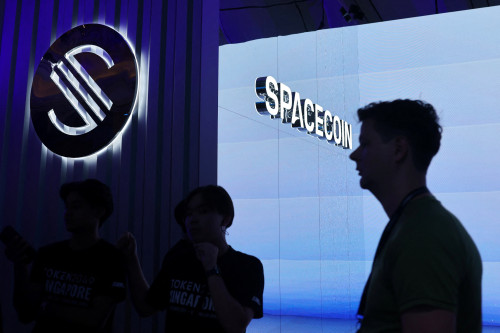By Hyunjoo Jin and Akash Sriram
(Reuters) – Tesla is expected to report its lowest gross profit margin in more than six years on Tuesday after a chaotic week that included major layoffs, vehicle price cuts and urgent calls by investors for clarity on product strategy.
Tesla’s chief, Elon Musk, likely will face pointed questions from investors on the post-results conference call about the fate of the so-called Model 2, a low-cost vehicle he had promised in January would be available in 2025.
Reuters exclusively reported on April 5 that Tesla had scrapped plans for the model and shifted focus to building a self-driving robotaxi on the same small-car platform. Musk initially posted on social media that “Reuters is lying” but has yet to identify any inaccuracies or clarify the fate of the model. Investors had pinned hopes for sales increases on the Model 2.
Graham Tanaka, a portfolio manager at Tanaka Growth Fund who was an early bull in Tesla shares, said he had liquidated the last of his position in recent days because of the uncertainty over the Model 2 and slow production of the Cybertruck electric pickup.
“The Model 2 was supposed to be the moat around their business model, but it’s been delayed at a minimum,” he said. “We think there’s going to be more risk in owning Tesla next year because we don’t know how fast the Cybertruck will be ramping up.”
The billionaire CEO had been expected to meet with India Prime Minister Narendra Modi on Monday and announce major investments in an auto factory that had been expected to produce a small, affordable model. Musk canceled at the last minute, citing “very heavy Tesla obligations.”
For now, Tesla’s sales growth is slowing, which is expected to weigh heavily on Tuesday’s results. The automaker earlier this month reported an 8.5% decline in deliveries and rising inventories. Over the weekend, Tesla announced the latest in a series of price cuts globally on its Model 3, Model Y and other models, further eating in to margins.
Several analysts expect Tesla’s annual deliveries to fall for the first time in 2024 after years of double-digit growth. Tesla warned in January that deliveries growth would be “notably lower” this year, signaling that price cuts would be insufficient to lift demand.
Tesla shares have lost about 43% so far this year as of Monday afternoon.
Wall Street expects automotive gross margin excluding regulatory credits to be 15.2%, according to 20 analysts polled by Visible Alpha, down from 19% a year earlier and the lowest since the fourth quarter of 2017.
The automaker could also face questions about its struggle to mass-produce its newer 4680 batteries, which Tesla needs for the Cybertruck and hoped to deploy in other models to reduce costs.
Tesla’s battery chief, Andrew Baglino, resigned last week as the company started layoffs expected to include more than 10% of its global workforce.
ROBOTAXI FUTURE?
Tesla remains the world’s most valuable automaker with a market capitalization of about $468 billion, but that is down by two-thirds from its record highs reached in November 2021. Its valuation has historically been based largely on hopes for mass-market EV sales and breakthroughs in self-driving vehicles.
Since the Reuters report on the shift in Model 2 strategy, analysts have noted such a change could cause an exodus from the shares by investors who had been betting on rapid sales growth. Those investors, analysts said, would likely be replaced by others who are willing to wait for self-driving Teslas.
Musk has predicted the imminent arrival of fully autonomous cars for years but may still be years from delivering, given the steep engineering and regulatory challenges. Tesla faces lawsuits and investigations into its Autopilot and Full Self-Driving systems, which do not make vehicles fully autonomous.
Musk has raised more questions with recent social media posts about Tesla’s self-driving vehicle strategy. He recently teased a “Robotaxi unveil” on “8/8,” presumably meaning August 2024, and he later posted that going “balls to the wall” on autonomy was a “blindingly obvious” move.
To spark consumer interest, Tesla recently offered a free trial for Full Self-Driving and over the weekend cut the option’s price to $8,000 from $12,000.
As Tesla looks to bolster sales and margins, it may not get much help its latest model, the Cybertruck, which has proved difficult for the automaker to mass-produce. The company does not report production figures for the pickup separately, but it last week recalled nearly 3,900 of the vehicles that were produced between its introduction last November and April.
Investors on Tuesday will likely seek guidance on whether Musk maintains his goal of producing 200,000 Cybertrucks in 2025. Musk said the model would not produce positive cash flow until 2025.
(Reporting by Hyunjoo Jin in San Francisco and Akash Sriram in Bengaluru; additional reporting by David Randall in New York; Editing by Brian Thevenot and Matthew Lewis)



